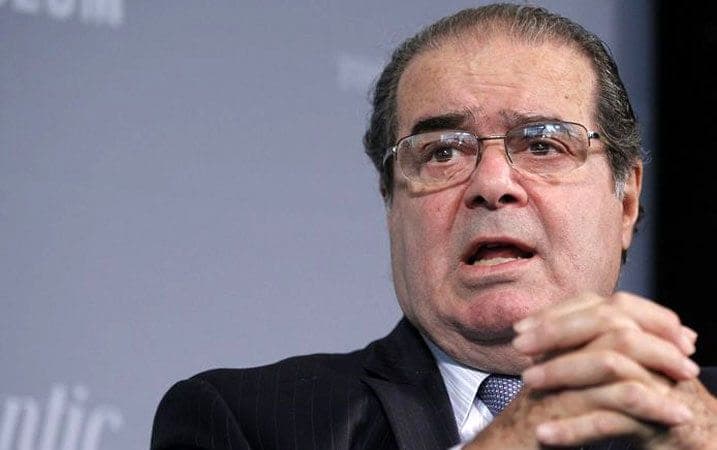As a law professor covering two neuralgic areas — family law and the religion clauses of the Constitution — I have taught more than a few memorable Justice Scalia opinions. Many have already written about how rare it is to read a US Supreme Court opinion that can make you explode with laughter while simultaneously offering a surprising insight. Justice Scalia could produce these at will.
He should be even better known — especially in the controversial areas in which I teach — for his commitments to letting citizens speak for themselves (versus judges speaking for them) and for peeling back the sausage we call government, and telling citizens how things really get done.
No matter one’s stance on the legacy of Justice Scalia, who was laid to rest Saturday, he deserves our thanks for treating citizens as intelligent actors who get a “say” about the laws that govern them.
On the matter of giving citizens’ opinions weight, this was most evident in opinions where the Court was asked to declare the existence of federal constitutional rights which were not in the text of the Constitution. As perfectly expressed by a prior Justice, Byron White:
The Judiciary, including this Court, is the most vulnerable and comes nearest to illegitimacy when it deals with judge-made constitutional law having little or no cognizable roots in the language or even the design of the Constitution.
This rings logically true. When five elitely educated, unelected human beings are permitted to “find” nontextual rights that trump all other laws — federal, state, and local — citizens are bound to feel abused.
In several cases involving more than a few sticks of dynamite, Justice Scalia refused to be tempted, and excoriated those who couldn’t resist grabbing power for the Court. Here’s how he did it.
In cases involving abortion, family law, and assisted suicide, complainants would argue that the Fourteenth Amendment’s Due Process clause implies a “right of privacy” covering a broad swath of decisions highly important to the individual:
- The right to abort an unborn child
- The right to sue for paternity rights of a child conceived with a married neighbor
- The right to require the state to recognize as “marriage” a union with a person of the same sex
- The right to assisted suicide
In its more reasonable days, the Court would then ask whether the claimed right was part of America’s “history and tradition,” a right without which “ordered liberty” could not exist. Their analysis would require them to review the state laws treating the subject over many decades or even centuries in order to determine whether or not the people had spoken strongly on a subject.
So, for example, the body of states’ long and unbroken traditions — against assisted suicide, for procreative marriage, and against letting adulterers break into an ongoing marriage to seek paternity rights — were deemed definitive. The Court could not “invent” a right the people had never embraced, but had rather consistently denied. Thus the cases (pre-Obergefell, the Court’s recent same-sex marriage opinion) did not announce new, nontextual constitutional rights with no support in our national history.
In opinions on these types of matters, some of Justice Scalia’s most quotable zingers appeared. He opened the case about the adulterous neighbor (which involved a dizzying series of partner changes) with the quip, “The facts of this case are, we must hope, extraordinary.” To the dissenting justices’ insistence that adulterous biological fathers should have rights (as against every states’ laws denying them), no matter how these clashed with the rights of the still-married couple, Scalia likened this to “inquiring whether there is a liberty interest in firing a gun where the case at hand happens to involve its discharge into another person’s body.”
Justice Scalia’s response to Justice Kennedy’s emotion-ridden and law-free majority opinion in Obergefell was likewise blunt, and respectful of the people’s prior choices:
We have no basis for striking down a practice that is not expressly prohibited by the Fourteenth Amendment’s text, and that bears the endorsement of a long tradition of open, widespread, and unchallenged use dating back to the Amendment’s ratification.
If the people want to change the law, he taught, they can change their own state law, or amend the Constitution. The Court cannot and must not do either.
On abortion, Scalia opined similarly, even to the point of upsetting the pro-life community at times. The Constitution, he said, contains neither a right to abortion nor a right to protection for unborn human life. Let the people decide in their states.
Similarly, on the matter of the free exercise of religion, much to the chagrin of many free exercise academics like myself, he held that judges should not be the last word on the constitutional balance between legislative power and religious freedom, but that the people, acting through their legislators, should. (Like many others, I think that the First Amendment, like other textual constitutional guarantees, invites judges to robustly protect the explicit right named: the free exercise of religion).
In addition to his jealous guarding of citizens’ democratic prerogatives, Justice Scalia was a masterful illuminator of the workings of government. On the Court’s invention of same-sex marriage ex nihilo, he wrote:
Today’s decree says that my Ruler, and the Ruler of 320 million Americans coast-to-coast, is a majority of the nine lawyers on the Supreme Court.
Cutting deeper into this critique, he added:
The Federal Judiciary is hardly a cross-section of America. Take, for example, this Court, which consists of only nine men and women, all of them successful lawyers who studied at Harvard or Yale Law School. Four of the nine are natives of New York City. Eight of them grew up in east- and west-coast States. Only one hails from the vast expanse in-between. Not a single Southwesterner or even, to tell the truth, a genuine Westerner (California does not count). Not a single evangelical Christian (a group that comprises about one quarter of Americans), or even a Protestant of any denomination.
On the matter of judges’ willingness to hunt through mountains of “legislative history” in order to find “evidence” of the meaning of the statute (beyond the text that legislators actually enacted), he wrote that this was like “look[ing] over the heads of a crowd and pick[ing] out your friends.” And he noted that legislators could advance-engineer a court’s analysis of legislative history by packing it with particular words, unless the “legislature has a stupid staff.”
There is no doubt that there is a vast gulf between the world inhabited by Supreme Court justices and that occupied by the rest of us, citizens all, who do not get to say what the law is by a vote of 5 to 4. Justice Scalia was a man blessed with an extraordinary mind and education, but who insisted on remembering that the law comes from the bottom up, from the people, and not from the top down.
Helen M. Alvaré is a professor of law at George Mason University School of Law, where she teaches Family Law, Law and Religion, and Property Law. She is the founder of Women Speak for Themselves.


















